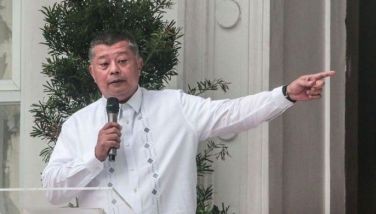Miriam wants 'false report' on bishops' SUVs investigated
MANILA, Philippines - Sen. Miriam Santiago wants an investigation into the “false report” that the vehicles received by seven Catholic bishops from the Philippine Charity Sweepstakes Office were high-end Mitsubishi Pajeros.
“By the process of lateral thinking, I respectfully move to investigate the source of the false report about the so-called ‘Pajero bishops’ when it turns out that no Pajeros were involved,” Santiago said at the resumption of the Senate Blue Ribbon committee hearing yesterday on the alleged PCSO funds misuse.
It was the first time that bishops were invited to testify in a corruption hearing.
She said an investigation should unmask “this maleficent twisted genius” behind the Pajero tag.
“Was this media spin designed to cover up the crime of depositing without authorization in a private bank the sum of P1.548 billion? Was this media spin further designed to call public attention away from the annual sum of some P7.603 billion made available to the sticky fingers of the PCSO Board?” Santiago asked.
Like the wanton world-class theft of public funds and conspicuous consumption generated by the road user’s tax, Santiago said the PCSO anomaly is “bodaciously corrupt.”
“Keep the bishops out of it,” she said.
At the start of the hearing, the highly charged Santiago came to the defense of the Catholic bishops who were dragged into the controversy as she lambasted COA officials for saying that the PCSO grant of P6.49 million to certain dioceses of the Catholic church violated the Constitution.
“I humbly submit that the COA report is wrong, and that there was no constitutional violation. Under the Constitution, the power of the COA is to audit government funds, not to settle questions of constitutional law,” she said.
Santiago noted that the power is granted only to the Supreme Court, and that COA should have recommended that the constitutional issue be raised to the Department of Justice.
Santiago cited the 1937 Aglipay v. Ruiz case where the SC said there was nothing unconstitutional about the post office’s issuance of postage stamps commemorating the international eucharistic congress of the Catholic church.
“The basic purpose of the grant of public funds is clearly stated on the face of the checks themselves: ‘purchase of service vehicles to be used by the diocese in its various community and health programs.’ If there is any benefit to the bishop and the diocese, it is merely incidental,” Santiago said.
The Constitution contains at least three specific provisions concerning the relationship of church and state.
The first provision is found in Article II, Declaration of Principles, which states in Section 6: “The separation of Church and State shall be inviolable.”
The second provision is found in Article III, Bill of Rights, which states in Section 5: “No law shall be made respecting an establishment of religion, or prohibiting the free exercise thereof.”
The third provision is found in Article VI, the Legislative Department, which states in Section 29 paragraph 2: “No public money or property shall be appropriated, applied, paid, or employed, directly or indirectly, for the use, benefit, or support of any sect, church, denomination, sectarian institution, or system of religion.”
Repeal PCSO charter
Santiago also joined calls for the repeal of the charter of the PCSO, saying its multi-billion pesos annual revenues from lotto and sweepstakes have become “black budget” of the President and the agency’s officials.
“As chair of the Senate committee on revision of laws, I shall call a public hearing this August on a new PCSO charter, as well as a new Pagcor charter. Both the PCSO and Pagcor funds constitute the President’s Social Fund, which has served as a black budget, meaning a budget insulated from public scrutiny, confined to the dark and insulated from sunshine, sneaked through the backdoor instead of undergoing the open process of congressional budgetary authorization,” Santiago said.
“To give to the PCSO Board the power to allocate the galactic sum of P7.603 billion a year is to excavate a yawning democratic deficit. The present situation is feudal and contrary to best international practice. The best practice is the one-fund concept, under which all government revenues are remitted to the Treasury, and disbursed only as authorized by Congress,” she said.
“There should be no President’s Social Fund, because the entire government budget is already his budget. This is why we call it the President’s Budget,” Santiago added.
Under her proposal, Santiago said a new law should repeal not only the PCSO charter, but also all the various republic acts that seek to allocate certain PCSO funds to “alphabet-soup” national programs.
The new law will limit the PCSO Board’s functions to regulating and supervising sweepstakes and lotto operations.
The entire revenues for the year will be remitted to the national treasury. Only the President and Congress will prioritize and allocate the fund.
Five percent of the lotto earnings shall be given to local government units, and only 10 percent shall be allocated for administrative expenses.
“The PCSO bureaucracy shall be slashed, their allowances and privileges abolished, and the public relations budget removed,” said Santiago, whose proposal came on the heels of similar proposals by senators Ralph Recto and Francis Escudero.
Sen. Franklin Drilon, for his part, was calling for the privatization of both the PCSO and Pagcor.
Santiago also recommended to the Blue Ribbon committee that all PCSO officials be made accountable for the depositing in 2009 with a private commercial bank the sum of P1.548 billion without prior approval of the Department of Finance as required under DOF order No. 27-05. They should be criminally liable, the senator said.
Sadness
Cotabato Archbishop Orlando Quevedo said the wrongful accusations have seriously affected many Catholic faithful.
“We express our sadness that our sincere desire to help people and receive necessary assistance for doing so has confused, disturbed, and even scandalized many of the Catholic faithful,” he added.
“First, a false report was placed in the papers, I don’t know what source it came, that we had Pajeros and SUVs. That came and it scandalized the whole country... We were shamed that this was so,” Quevedo said.
Quevedo even lamented that the wrongful report was not corrected in the papers (not The STAR).
“We believe that it is important for us to clear everything in the air and return the vehicles. We think we can do our job without encumbrance of the political or any reason whatsoever that has given shame to the whole conference,” he added.
“I am sad to say that mistrust has been injected into that relationship (with the PCSO),” Quevedo said.
Grilled by Senate President Pro-Tempore Jinggoy Estrada over the “Pajero” tag, PCSO chairman Margarita Juico explained that the expose came about because of the report of the Commission on Audit (COA).
Juico was booed by the crowd when she explained to the Senate that at that time of the expose, the Board did not have a copy of “which vehicles were sent out.” The finding they got from COA was there were five vehicles costing P6.9 million that had been granted to the Catholic church and charged to the Charity fund, Juico said.
No violation
Meanwhile, Senate President Juan Ponce Enrile said that the bishops did not violate any law.
“They’re not prohibited by the Constitution (from receiving public funds). It’s the government that’s prohibited from doing so (giving public funds to the Church or any other religious group),” Enrile told reporters after yesterday’s hearing.
“The government has the responsibility to protect public funds. That’s why the Constitution prohibits the government from using taxpayers’ money for the use, benefit and support of any priest, preacher, religious minister or religious denominations and sectarian institutions,” Enrile said.
Enrile said he had also received information that the PCSO has put up a “Kaunlarang Pangkabuhayan” project costing between P80 million and P100 million that’s being managed by a religious group. “I’d like to know if this is true,” he said.
“I think they (the bishops) were unfairly accused of receiving expensive vehicles. And I think the matter was clarified already,” Enrile said.
Enrile disclosed that from the checks that he saw, there was no mention of Mitsubishi Pajeros, but 4 x 4 Montero utility vehicles.
“It’s unfortunate that comments were made based not on the documents so the public was confused. The truth did not come out,” he added.
During the hearing, PCSO chairman Juico explained that what was wrong was to draw money from charity funds to give to bishops for the purchase of vehicles for their use.
Enrile also revealed that he had recently obtained documents that show the government has been paying billions of pesos in rentals to a Malaysian company for lotto terminals. This, he said, has been going on since the Ramos administration.
Enrile said that as far as he knew, PCSO funds consisted of three components. Fifty-five percent is allocated for prizes, while 30 percent is used under the PCSO Charter as charity funds, while the balance of 15 percent is used as operational funds.
“It’s from the 15 percent where the rental of equipment should be sourced. But since they pay a lot of money for rental, then the 15 percent is not enough so they had to borrow money and now they are deep in debt,” Enrile said.
- Latest
- Trending




























